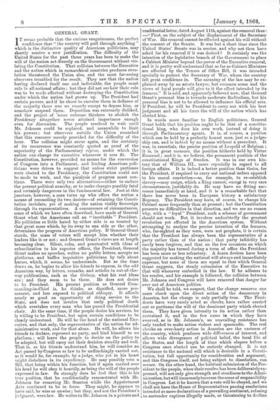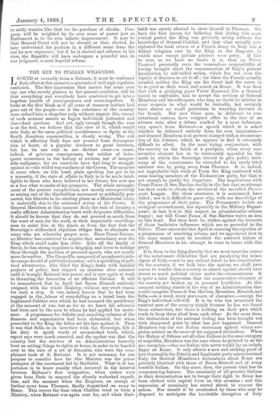GENERAL GRANT.
IT seems probable that the curious sanguineness, the perfect confidence that " the country will pull through anything " which is the distinctive quality of American politicians, may shortly receive a new justification. The difficulty of the United States for the past three years has been to make the will of the nation act directly on the Government without vio- lating the Constitution. That collision between the Executive and the nation which in monarchical countries produces revo- lution threatened the Union also, and the most far-seeing observers trembled for the result. They saw that the nation having declared itself one and indivisible, the people must rule in all national affairs ; but they did not see how their rule was to be made effectual without destroying the Constitution under which the nation had grown up. The President had certain powers, and if he chose to exercise them in defiance of the majority there was no remedy except to depose him, or somehow suspend them. Deposition was extremely disliked, and the project of 'some extreme thinkers to abolish the Presidency altogether never attained importance enough
even for discussion. The people resolved to wait until Mr. Johnson could be replaced, and meanwhile to limit his powers ; but observers outside the Union remarked that this resource merely provided for the difficulty of the hour. The collision might occur again, and the certainty of its occurrence was constantly quoted as proof of the superiority of the Parliamentary regime, under which the nation can change its executive whenever it sees fit. The Constitution, however, provided no means for the conversion of Congress into a Parliament, and leading American poli- ticians were driven to suggest that unless strict partizans were elected to the Presidency, the Constitution could not be made to work, and the paralysis of progress must con- tinue. There were only two alternatives—either to endure the present political anarchy, or to make changes possibly fatal .and certainly dangerous in the fundamental law. Just at this juncture, however, a man turns up who offers the nation a means of reconciling its two desires—of retaining the Consti- tution inviolate, yet of making the nation visibly Sovereign through its representatives. A concurrence of circumstances, some of which we have often described, have made of General Grant what the Americans call an " inevitable " President. No politician so little hated by either side is so trusted by . that great mass which, by its sway to one side or the other, determines the progress of American policy. If General Grant stands, the mass of voters will accept him whether their leaders like it or not ; and General Grant's views are at length becoming clear. Silent, calm, and penetrated with ideas of subordination to his superior officer, the President, General Grant makes no speeches, writes no public letters, accepts no platforms, and baffles inquisitive politicians by talk about horses, which, it seems, he understands. But as the time draws on, he begins to allow his friends to express, in the odd American-way, by letters, remarks, and articles in out-of-the- way publications, such as the Galaxy, what his real ideas -are ; and they seem to be these. He does not desire to be President. His present position as General Com- manding-in-Chief is, he thinks, as dignified, more per- manent, and less exposed to political obloquy. It affords nearly as good an opportunity of doing service to the State, and does not involve that early political death which overtakes every man who has passed the Presidential chair. At the same time, if the people desire his services, he is willing to be President, but upon certain conditions to be clearly understood. He will be the head of the national Exe- cutive, and that only, the representative of the nation for ad- ministrative work, and for that alone. He will, he allows his friends to declare, represent no party, and bind himself to no platform ; will leave the people to decide on the policy to be adopted, but will carry out their decision steadily and well. That is, as his friends understand him, he will consider an Act passed by Congress as law to be unflinchingly carried out, as it would be, for example, by a judge, who yet in his heart might disbelieve in its expediency. He may possibly veto a Bill, that being within his function, but if again carried over his head he will obey it heartily, as being the will of the people expressed in law. So strongly does he feel that this is his true position, that he confidentially remonstrated with Mr. Johnson for removing Mr. Stanton while the Appointment Acts continued to be in force. They might, he appears to have said, be wise or unwise ; but they, and not the President's judgment, were law. He writes to Mr. Johnson in a private and
confidential letter, dated August 11th, against the removal thus : —"First, on the subject of the 'displacement of the Secretary of War. His removal cannot be effected against his will without the consent of the Senate. It was but a short time since the United States' Senate was in session, and why not then have asked for his removal if it was desired ? It certainly was the intention of the legislative branch of the Government to place a Cabinet Minister beyond the power of the Executive removal, and it is pretty well understood that as far as Cabinet Ministers are affected by the _ Tenure of Office Bill, it was intended specially to protect the Secretary of War, whom the country felt great confidence in. The meaning of the law. may be ex- plained away by an astute lawyer, but common sense and the views of loyal people will give to it the effect intended by its framers." It is said, and apparently believed now, that General Grant's personal bias is towards moderate Radicalism, but his personal bias is not to be allowed to influence his official acts. If President, he will be President to carry out with his best judgment and all his force the will of the nation which has elected him.
In words more familiar to English politicians, General Grant holds that his position ought to be that of a constitu- tional king, who does his own work, instead of doing it through Parliamentary agents. It is, of course, a position which can be held by a perfectly honest man, just as a judge- ship can, and is indeed by no means without a precedent. It was, in essentials, the precise position of Leopold of Belgium ; it is, in great measure, the position hitherto held by Victor Emanuel ; and it is, we believe, the permanent position of the constitutional Kings of Sweden. It was in our own his- tory that of William III., more especially in regard to all foreign affairs. It is indeed a better position than theirs, for the President, if required to carry out national orders opposed to his moral conviction—as, for example, to re-establish slavery—may resign, which a King cannot, except in very rare circumstances, justifiably do. He may have no fitting suc- cessor immediately at hand, and it is a remarkable fact that there has never been in European history a satisfactory Regency. The President may have, of coarse, to change his Cabinet more frequently than at present ; but the Constitution presents no difficulties in that direction, and we see no reason why, with a "loyal" President, such a scheme of government should not work. But it involves undoubtedly the greatest revolution yet effected in the American system. Without attempting to analyze the precise intention of the framers, who, far-sighted as they were, were not prophets, it is certain that the President has always been the representative of a party rather than of the nation ; that party infidelity has rarely been forgiven, and that on the few occasions on which the majority has turned daring a term of office the President has been more or less refractory. A dozen devices have been suggested for making the national will always and immediately supreme, but none of them are equal to that which General Grant suggests, the steady submission of the Executive to that will whenever embodied in the law. If he adheres to his resolve, and his example is followed, the collision between Mr. Johnson and Congress will have removed that danger for ever out of American politics.
We shall be told, we suspect, that the change removes one more check upon the direct action of the democracy in America, but the charge is only partially true. The Presi- dents have very rarely acted as checks, have rather carried out as partizans the will of the dominant party which elected them. They have given intensity to its action rather than restrained it, and in the few cases ix which they have swerved, as in Mr. Johnson's, an unavailing resistance has only tended to make action violent and spasmodic. The real checks on over-hasty action in America are the vastness of the country, which produces wide differences of interest, and allows wide divergences of political belief, the local life of the States, and the length of time which elapses before a Congress once elected can be entirely changed. It is not resistance to the national will which is desirable in a Consti- tution, but full opportunity for consideration and argument, and this Congress itself, not being subject to dissolution, can secure. On the other hand, the habitual submission of the Pre- sident to the people, when their resolve has been deliberatelyex- pressed, will not only give strength and steadiness to the Admi- nistration, but will immenselyincrease the sense of responsibility in Congress. Let it be known that a vote will be obeyed, and we shall not have the House of Representatives passing resolutions intended as mere declarations of a prevailing sentiment, refusing to surrender captives illegally made, or threatening to decline
to ratify treaties like that for the purchase of Alaska. Con- gress will be weighted by its own sense of power just as Parliament is, to its own infinite improvement. It may be that General Grant will not be elected, or that, elected, he may understand his position in a different sense from the one he now expresses ; but if he is elected and adheres to his view, the Republic will have undergone a peaceful and, in our judgment, a most hopeful reform.









































 Previous page
Previous page